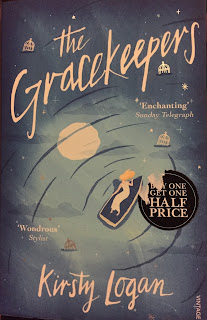Oh, my Gods, this book. Oh, this book broke me.
So, it was introduced to our book group as "The Next Night Circus", a book which has thus far been the standard aginst which all others fall. However, I'd scarcely got half dozen pages in to it when it struck me that this was not The Night Circus, no.
This was Nights at the Circus.
Well, no, it wasn't. Logan is no Angela Carter (considering that I hold Carter to a cross between be a messianic figure for the study of fairytale and a literary Godhead, I'm doubt if I would ever make that comparison without caveat.) Her prose does not sparkle with endless profundity, she makes no bold, brain shattering arguments with her plots. However, the comparison can be drawn, the influence recognised. The main difference is that The Gracekeepers is a profoundly quiet novel.
The Night Circus rings with wonder, glory and magic. Nights at the Circus dazzles, swoops and blazes much as Fevvers herself. The clue with both of these is in the name - we are being invited to an entertainment, a spectacle. The Gracekeepers is named for the small, brightly coloured birds whose slow starvation marks out the length one should spend upon grief.
The quietness of The Gracekeepers suits its vast, empty, watery world, suits its lonely, voiceless protagonists, suits the very queerness of the novel. Because it is a queer novel, contrasting the safe, prosperous, conformist world of the landlockers with the uneasy itinerancy of the damplings - forever in the shadow of religious fanatics, or at the mercy of a violent militia.
The Circus Excalibar's play with gender and subversion is at once celebrated and reviled by their landlocker audience, and they inhabit a tenuous existence, tolerated only for the thrill they can give. Aboard ship, their loves are passionate and non-normative, their identities fluid and impossible to discern in binary terms. Their bodies are covered with scars they have taken.
To further the metaphor, the damplings are repeatedly described as a family, albeit one marred and made dysfunctional by the clear stratification of power within it. Some members embrace their outsider status, others long to return (or to gain) the respectability of land. In to this mix comes North - unrepentant dampling, an outsider even in the Circus - and Callanish - a landlocker gracekeeper trapped by her past, resisting the call of the sea.
And, until I was two thirds of the way through the novel, this was what I was enchanted by, this is what I was lost in. Whether North and Callanish's connection is asexual, lesbian, or a sweet, moving portrayal of twin spirits who understand each other on a level that transcends gender and sexuality, that connection is the heart of the book, the strength of the novel. It moved as slowly as the tide, each beat heart-rending, gorgeous, captivating.
But the problem with The Gracekeepers is that it felt the need to have a plot. And whereas most of the novel's other characters (even bit parts) are drawn lightly, cleverly, that plot rested upon the antagonist who felt like like the cheapest caricature grabbed from the brashest story of woman against woman. Her actions, which drive the so-called climax, were inexplicable, unconvincing, and unfitted - in tone, or matter - for the novel. The only explanation I can think of for the inclusion of such an event was that it permitted a neat and unproblematic ending to a novel that otherwise would have continued, troubled, tragic, ambiguous.
And, honestly, flawless.

No comments:
Post a Comment